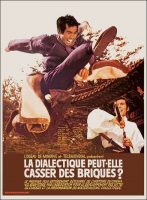La Dialectique Peut-elle Casser des Briques
Can Dialectics Break Bricks? movie storyline. Imagine a kung fu flick in which the martial artists spout Situationist aphorisms about conquering alienation while decadent bureaucrats ply the ironies of a stalled revolution.
This is what you’ll encounter in René Viénet’s’s outrageous refashioning of a Chinese fisticuff film. An influential Situationist, director René Viénet’s stripped the soundtrack from a run-of-the-mill Hong Kong export and lathered on his own devastating dialogue. A brilliant, acerbic and riotous critique of the failure of socialism in which the martial artists counter ideological blows with theoretical thrusts from Debord, Reich and others.
Can Dialectics Break Bricks? in French “La Dialectique peut-elle Casser des Briques?”, in English, is a 1973 Situationist film produced by the French director René Viénet which explores the development of class conflict through revolutionary agitation against a backdrop of graphic kung-fu fighting.
For its visuals the film uses 1972 martial arts film Crush by Tu Guangqi, which tells the story of anti-colonialist revolt in Korea during the period of Japanese occupation. The source film was dubbed over by the filmmakers as an example of détournement. Viénet’s intention was to adapt a “spectacular” film typical of the film industry to the purposes of a radical critique of cultural hegemony and thus an expression of subversive revolutionary ideals.
The narrative focuses on a conflict between proletarians and bureaucrats within state capitalism. The proletarians enlist their grasp of dialectics in the fight against their oppressors, while the bureaucrats defend themselves using a combination of co-optation and violence. The film is noted for its humorous approach to this subject matter.
The film also contains numerous celebratory references to revolutionaries who fought for the realisation of a post-capitalist world, including Marx, Bakunin, and Wilhelm Reich, as well as scathing criticism directed toward the French Communist Party, trade unionism and Maoism. Subplots dealing with issues of gender equality, alienation, the Paris Commune, May 1968 and situationist politics itself are riddled throughout the film.
About the Production
Since Guy Debord has permanently withdrawn all his films from circulation, Can Dialectics Break Bricks? is virtually the only available example of a situationist use of cinema. Viénet’s’s film is a far lesser creation than any of Debord’s, but still well worth seeing for its consistent use of the situationist technique of détournement — the diversion of already existing cultural elements to new subversive purposes. Other filmmakers have used aspects of this technique, but only in confused and half-conscious ways, or for purely humorous ends à la Woody Allen’s What’s Up, Tiger Lily?
Viénet’s film is even funnier, but its humor comes not so much from its satire of an absurd film genre as from its undermining of the spectacle-spectator relation at the heart of an absurd society. In both its social-critical content and its self-critical form, it presents a striking contrast to the reformist whining and militant ranting that constitute most supposedly radical media. By turning the persuasive power of the medium against itself (characters criticize the plot, their own role in it, and the function of spectacles in general), it constantly counteracts the viewers’ tendency to identify with the cinematic action, reminding them that the real adventure — or lack of it — is in their own lives.
Can Dialectics Break Bricks? (1973)
Directed by: René Viénet
Starring: Jason Pai Piao, Chen Hung-Lieh, Jacques Thébault, Michèle Grellier, Raoul Curet, Dominique Morin, Patrick Dewaere, Jean-Pierre Leroux, Yves-Marie Maurin, Dominique Page, Michel Elias, Michel Bardelet
Screenplay by:
Production Design by:
Cinematography by:
Film Editing by:
Costume Design by:
Set Decoration by:
Art Direction by:
Music by:
MPAA Rating: None.
Distributed by: Telemondial (World-wide) (theatrical)
Release Date: April 17, 1973
Views: 130

